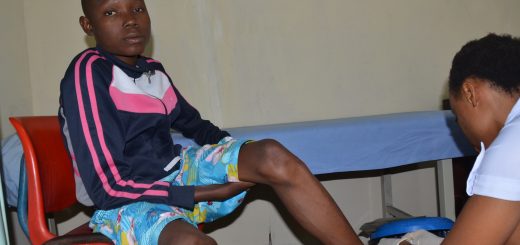Jude Idada in Boom Boom
By Geraldine Akutu 05 May 2019

Jude Idada is an accomplished author and screenwriter. He has written and published a collection of short stories, A Box of Chocolates, an anthology of poetry; Exotica Celestica, two published stage plays, Oduduwa – King of the Edos, and Sankara. He has also written two children books, Didi Kanu and the Singing Dwarfs of the North. The Theatre Arts graduate of the University of Ibadan, who just published his new book, Boom Boom, tells GERALDINE AKUTU what the book is all about and other issues.
When did you first realise you wanted to be a writer?
At an early age, my father gave me a book called Kon-tiki Expedition by Thor Heyerdahl and after reading that book, I was so mesmerised, and moved by it, that when I turned the last page, I knew right there, I would be a writer. I wrote my first novel at age eight.
You just published a new book Boom Boom. Can you tell us something about it?
Boom Boom is a children’s book that is told in the first person, through the eyes of a child, as he grapples with the familial bonds of love, friendship, loyalty and trust in the face of impending doom. It is the story of Osaik, an eight-year-old boy. He is charming and has an unusual ability to hear things no one else hears. His world is thrown into disarray when a debilitating disease takes his mother from him. Despite his grief, he has to find a way of saving his little sister, Eghe, from the same disease. Alongside his dad, and Kompa, his dog, they begin a race to get her all the help she needs. It is not an easy one, because at every turn, there is a new obstacle to avoid and a new hurdle to climb. In this dramatic, fast paced story of loss, faith and hope, the limits of love, sacrifice, friendship, loyalty and family ties are tested as the struggle to save his sister’s life brings Osaik and those around him to a new knowledge of the world they can see, the world they cannot see, and the part of themselves they never knew existed.
Why the focus on children and what makes the book unique?
I focused on children because of the need to educate children of the sickle cell disease, which the book is about, so that when they get to the age where they make decisions as adults concerning who their spouse will be, they will remember the right steps to take and things to do concerning the disease. It is a unique book, because it provides all the medical information about the disease and the actions to take concerning its management and eradication while engaging and entertaining the reader in a simple, childlike manner. It is also a natural cross over book that will surely attract adult readers.
What often comes to your mind about the book?
I feel happy with the look and feel of the physical book in addition to its potential of being a vehicle of entertainment of children, but also as a tool for behavioural modification, character formation and opinion shaping of the public concerning the sickle cell disease.
How much research went into that work before it was published?
I did months of research, that involved first reading all the literature concerning the disease, then speaking to health care practitioners who are involved in the treatment, management and eradication, before I spoke with families of the late victims of the disease, and actual warriors who live each day with it.
When the first drafts were done, I got the management of the Sickle Cell Foundation to read it, and based on their feedback, I made additional changes to the manuscript so as to ensure veracity of all the technical and medical information contained therein.
How long did it take you to write the book?
It took me a little more than two months, a period that was riddled with my ailment.
What inspired you to write?
The tragic loss of the On-Air-Personality Tosyn Bucknor, who I didn’t know personally, but whose death invoked the memories of two friends I had lost through the disease and reconnected me with the life and struggles of my dear friend Hauwa Audu, who is living with the disease. I wrote it because I wanted to change the minds and hearts of people, by connecting them with a story that lays bare the truth about the disease from the mouth of an innocent eight year old boy, so that the connection they have with the story will cause them to change their attitude towards the disease.
Has the publishing of your new book changed your process of writing?
Well, I actually do not have a fixed process of writing. I do it in view of the environment I find myself, the challenges I am facing at the time, and the peculiarity of the story I am writing. For Boom Boom, I wrote it through my being very ill, and thus, I could connect with the pain of sickness. It was very cathartic for me and emotionally raw. A true deep experience. So in answering that question, I will say it was another process of writing, which like others before it, was spiritual in and of itself.
What do you think makes a good book?
How much the reader can relate with the central theme of the story, held captive by the plotline and story, and most importantly, see reality in the actions of the characters and believability by the nature and actions of the same characters.
What is the most unethical practice in the publishing industry?
Piracy as it concerns the staff of publishing houses who give the pirates the soft copies of the book for them to republish their versions.
What’s a typical writing day like for you?
I usually write at night and do other activities during the day. So, you will usually find me writing from 11pm to 6pm and sometimes 8pm. Most times I forget to eat while writing.
Who are your favourite authors? Which author had the greatest influence on you and in what ways?
Marie Corelli, Ben Okri, Michael Ondaatje, Wole Soyinka, August Wilson, Margaret Atwood, Stephen King, Jeffrey Archer and the list goes on. Marie Correli, because of the simplicity and deep metaphysical spirituality in her works. Her ability to deal with complex spiritual themes while keeping the book light, engaging, funny and contemporary is impressive. In addition to that, her characters are real and eternal.
You also make films. How do you combine the two without one affecting the other?
I am very project driven and have a practiced strength in compartmentalisation. Hence, I can separate both along the lines of style, format, length, imagery, dialogue and characterisation. I studied both art forms and have practiced over a length of time, which has helped me horning my skills and being able to switch off and on as it concerns film and my other artistic non-film pursuits.
What is your advice for aspiring writers looking to get their work published?
First, they have to write the best book possible. Then rewrite it. Before they rewrite it again and again, alone and with editorial guidance until they are satisfied with their manuscript. Then they have to choose the best kind of publisher that deals with books like theirs. After which the submission of queries begins. They should develop a thick skin and long suffering, because no matter how talented you think you are as a writer, some people won’t like your work and some publishers will return your manuscript either unread or rejected. Thus, they have to keep believing that the right publisher will pick their book someday. Should incase they do not have that patient, then they can go to the self-publishing route, wherein they pay to get their book published. Yet even this avenue requires a lot of work, and investment in time and money, so the writer has to be ready for the long haul. That being said the most important thing to do is not give up hope, be courageous and network, and spend infinitely more time writing than thinking about or dreaming of the book that they want to publish, which they haven’t yet written. A writer is one that has written and who writes, and not one you wants to write but finds convenient reasons not to.




Recent Comments